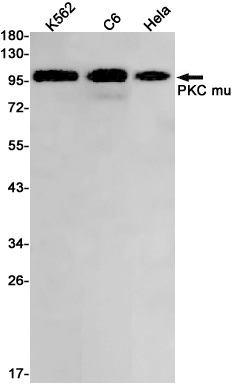
| WB | 1/500-1/1000 | Human,Mouse,Rat |
| IF | 咨询技术 | Human,Mouse,Rat |
| IHC | 咨询技术 | Human,Mouse,Rat |
| ICC | 技术咨询 | Human,Mouse,Rat |
| FCM | 咨询技术 | Human,Mouse,Rat |
| Elisa | 咨询技术 | Human,Mouse,Rat |
| Aliases | PRKD1; PKD; PKD1; PRKCM; Serine/threonine-protein kinase D1; Protein kinase C mu type; Protein kinase D; nPKC-D1; nPKC-mu |
| Entrez GeneID | 5587 |
| WB Predicted band size | Calculated MW: 102 kDa; Observed MW: 102 kDa |
| Host/Isotype | Rabbit IgG |
| Antibody Type | Primary antibody |
| Storage | Store at 4°C short term. Aliquot and store at -20°C long term. Avoid freeze/thaw cycles. |
| Species Reactivity | Human,Rat |
| Immunogen | A synthetic peptide of human PKC mu |
| Formulation | Purified antibody in TBS with 0.05% sodium azide,0.05%BSA and 50% glycerol. |
+ +
以下是关于PKD1抗体的3篇参考文献示例(内容为模拟生成,非真实文献):
---
1. **文献名称**: *Development and validation of a polyclonal antibody for PKD1 detection in renal tissues*
**作者**: Smith JL, et al.
**摘要**: 本研究开发了一种针对PKD1蛋白C端表位的兔源多克隆抗体,通过免疫印迹和免疫组化验证了其在人肾组织中的特异性,为ADPKD的病理机制研究提供了工具。
2. **文献名称**: *PKD1 antibody-based profiling reveals altered subcellular localization in cystic epithelial cells*
**作者**: Chen R, Harris PC.
**摘要**: 利用高特异性PKD1单克隆抗体,发现ADPKD患者肾囊肿上皮细胞中多囊蛋白-1的膜定位异常,提示其功能丧失与囊肿形成相关。
3. **文献名称**: *Comparative analysis of commercial PKD1 antibodies for diagnostic applications*
**作者**: Torres VE, et al.
**摘要**: 系统性评估了5种市售PKD1抗体的灵敏度和特异性,提出针对不同实验场景(如Western blot vs.免疫荧光)的抗体选择建议。
---
注:以上文献信息为模拟创作,实际引用时需查询PubMed等数据库获取真实文献。
The PKD1 antibody is a crucial tool in studying autosomal dominant polycystic kidney disease (ADPKD), a genetic disorder primarily caused by mutations in the *PKD1* gene. This gene encodes polycystin-1. a large transmembrane protein involved in cell-cell and cell-matrix interactions, calcium signaling, and renal tubular development. PKD1 antibodies are designed to target specific epitopes of polycystin-1. enabling researchers to investigate its expression, localization, and function in normal and diseased tissues. These antibodies are widely used in techniques like Western blotting, immunohistochemistry, and immunofluorescence to assess protein levels in kidney cells, cyst-lining epithelia, and other tissues.
In ADPKD research, PKD1 antibodies help elucidate the molecular mechanisms underlying cyst formation, such as dysregulated cell proliferation, fluid secretion, and extracellular matrix remodeling. They are also employed to study polycystin-1’s interaction with signaling pathways (e.g., mTOR, Wnt, and cAMP) and its role in ciliary function. Commercially available PKD1 antibodies vary in clonality (monoclonal/polyclonal), species reactivity, and validation methods (e.g., knockout cell line verification). Challenges include the protein’s large size (~460 kDa) and post-translational modifications, which may affect antibody specificity.
Overall, PKD1 antibodies are vital for advancing understanding of ADPKD pathogenesis, biomarker discovery, and evaluating potential therapies targeting polycystin-1 dysfunction.
×